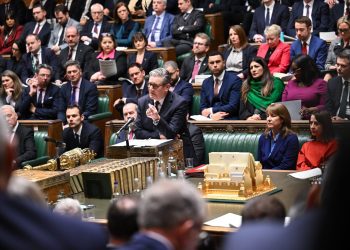The below content first appeared in Politics.co.uk’s Politics@Lunch newsletter, sign-up for free and never miss our daily briefing.
Kemi Badenoch promised to be bold and politically fearless when campaigning to be Conservative leader. For weeks, the former business secretary pledged to berate Keir Starmer into submission across the despatch box, confronting the immense burden shouldered by an opposition leader head-on: that of irrelevance.
And bold Badenoch has been. At prime minister’s questions, the Conservative leader has been relentless. Typically, she has used the session to explore a series of topics, each consciously selected to exploit Starmer’s political vulnerabilities. But after several sessions now, Badenoch’s scattergun style has yet to land — either a blow on Labour or positively among her 121 MP-strong parliamentary party.
It was therefore little surprise that the Conservative leader inaugurated a new approach this afternoon. After weeks of political vacillation, Badenoch used all of her allotted questions to interrogate a single topic — the approach Starmer favoured in her position.
Speaking from the despatch box today however, Badenoch’s chosen subject matter was not the farmers’ protests — despite the waves of wax jackets, tweeds, fleeces and flat caps burgeoning in parliament square. Rather than scrutinise Labour’s inheritance tax changes (which she believes threatens the future of family farming), Badenoch opted to question Starmer on migration.
It says something about our capricious politics that the Conservative leader’s decision to ask a Labour PM about immigration was utterly fatal. But here we are and it was. Starmer simply couldn’t believe his luck — or perhaps Badenoch’s penchant for political punishment — as he assumed control of the exchange.
***Politics.co.uk is the UK’s leading digital-only political website. Subscribe to our daily newsletter for all the latest news and analysis.***
The Tory leader began the session today with an apparent acknowledgement that she was wading onto familiar, even welcome territory for Starmer. Referring to last week’s exchange, Badenoch noted the prime minister “didn’t seem to want to talk about fraudsters in his cabinet [a reference to Louis Haigh’s resignation as transport secretary] — he seemed to want to talk about immigration”.
And so Badenoch announced her intention to fulfil the PM’s wish — never a wise strategy for an opposition leader. After ridiculing Starmer for his “relaunch” last week, in the form of his six-point “Plan for Change”, she asked: “Why was cutting immigration not a priority?”
The prime minister’s comeback was as potent as it was predictable. “I’m glad she now wants to talk about immigration. Last week, she said she didn’t, and for good reason”, he began. Starmer insisted his predecessor government, in which Badenoch served, “presided over record-high levels of immigration”.
Pointing to the recent Office for National Statistics (ONS) figures that showed net migration reached nearly a million people in the year to June 2023, Starmer attacked the Conservatives for pursuing a “one-nation experiment in open borders”.
Last month, the ONS significantly revised up its estimate of migration in the year to 2023 from 740,000 to 906,000. Commenting at the time, Starmer seized on the findings to make the point that the Conservative Party’s failure was even greater than previously thought. The prime minister accused his predecessors of deliberately running an “open borders experiment” — the Nigel Farage-esque attack line Starmer repeated today.
The bottom line is this: at this juncture, the PM is at his most politically comfortable and pugnacious when discussing immigration. And while the topic is fertile territory for Starmer, it remains a core political vulnerability for the Conservative Party — especially as Reform’s momentum builds.
Still, Badenoch ploughed on. Staring down the barrel of the despatch box, she insisted it was Starmer who “was the one campaigning for free movement” and previously signed a letter “demanding that foreign criminals be allowed to stay in Britain”. The Conservative leader noted that one such criminal whose deportation was blocked had gone on to commit murder.
Starmer hit back that this “was an example of failure under government to take the necessary measures to keep our country safe”. And after Badenoch called for the PM to implement a cap on immigration, Starmer continued: “They set a cap for each of those 14 years. It wasn’t hard, it didn’t stop people coming and it got a record number. They should apologise for what they have done with their open borders policy.”
This is not the first time Badenoch has charged into PMQs armed with a subject that Starmer has weaponised and dominated. Across recent sessions, undeterred by reality, the Conservative Party has pressed the government on inflation and economic growth, wrongdoing by cabinet ministers and now immigration. On the first point, Starmer pointed to the record of Liz Truss. On the second point, the PM highlighted the actions of Boris Johnson. Today, Starmer appeared at his most comfortable yet.
After all, the prime minister has been urged in recent weeks to be louder about the government’s policies on immigration, particularly by Labour backbenchers exposed to a Reform-Faragist insurgency. This afternoon, Badenoch presented Starmer with the perfect opportunity to neutralise the argument that Labour is soft on the issue.
Moving to illegal migration in her fourth question, Badenoch even referenced the Rwanda deportation plan, saying Starmer “will never take responsibility” for scrapping the purported deterrent. The Rwanda plan, dreamt up by Boris Johnson’s government, was never a popular policy. In January, Rishi Sunak doubled down on his bid to implement the scheme despite YouGov finding that 40 per cent of Britons wanted him to dispense with the plan altogether. (17 per cent wanted the policy amended).
Since then, Labour has made significant political noise over the cost of the scheme — £700 million — which ministers effectively accused their predecessors of covering up. In this regard, Badenoch’s comments today will further confuse the Conservative Party’s stance on potentially reviving the scheme, which was a point of contestation during the Tory leadership contest.
***Politics.co.uk is the UK’s leading digital-only political website. Subscribe to our daily newsletter for all the latest news and analysis.***
At the end of Badenoch’s questioning today, shadow home secretary Chris Philp entered into deep conversation with his leader. Philp, who was repeatedly reprimanded by the commons speaker for his seated chuntering, appeared to be congratulating Badenoch on a job well done.
The Conservative Party is convincing itself that opposition is going well. It isn’t. In coming sessions, Starmer will hope Badenoch continues with her recent PMQs practice of setting her own traps and stumbling into them. “It’s like the arsonist complaining about the people trying to put the fire out”, Starmer blasted at one point. He has repeated the refrain on several occasions since becoming prime minister.
Now, if Badenoch is to seize the advantage in the near term, her task is to say something new, either about Starmer or her mode of conservatism. Because as things stand Badenoch is in effect relitigating arguments that Starmer has already won. This is an exposed government, which the farmers’ protest today epitomises — but Badenoch is doing a job of making its defences appear impenetrable.
Meanwhile, the Reform threat to Badenoch’s leadership is proliferating. “I am watching the Tory backbenchers as Kemi Badenoch gives another average performance at PMQs”, Nigel Farage declared this afternoon. “There is almost no enthusiasm for her at all. They are in much deeper trouble than they know.”
The Reform chief has good reason to feel pleased. Across six questions and six answers this afternoon, Badenoch and Starmer highlighted each other’s vulnerabilities on immigration. The primary pitfall for both the Conservative and Labour parties is that such an exchange expands the political space Reform looks set to dominate.
Subscribe to Politics@Lunch
Lunchtime briefing
Richard Holden’s bill to ban first-cousin marriages met with opposition by independent MP
Lunchtime soundbite
‘We are setting up a clinical trial into the use of puberty blockers next year, to establish a clear evidence base for the use of this medicine.’
— Health secretary Wes Streeting announces that existing emergency measures banning the sale and supply of puberty blockers will be made indefinite.
Now try this…
‘Who are Starmer’s people?’
Labour is in danger of falling out with everyone, argues the New Statesman’s George Eaton. (Paywall)
‘Government department spends £1,200 on two folders’
Via BBC News.
‘The most powerful person in Europe’
Politico reports.
On this day in 2023:
Lord Farage? Bring back Boris? The Conservative ‘plots’ that could seal Rishi Sunak’s fate
Subscribe to Politics@Lunch
The post PMQs verdict: Kemi Badenoch must come to terms with her party’s vulnerabilities appeared first on Politics.co.uk.

































